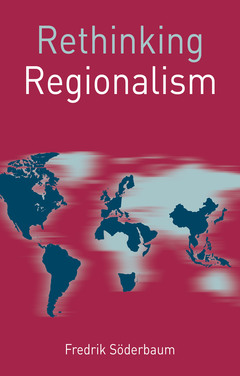Description
Rethinking Regionalism, 1st ed. 2016
Rethinking World Politics Series
Author: Söderbaum Fredrik
Language: English
Subject for Rethinking Regionalism:
Keywords
desegregation; Europe; European Union (EU); global governance; Governance
Rethinking Regionalism
Publication date: 11-2015
272 p. · 15.5x23.5 cm · Paperback
Withdrawn from sale
Publication date: 11-2015
272 p. · 15.5x23.5 cm · Paperback
Withdrawn from sale
Rethinking Regionalism
Publication date: 11-2015
Support: Print on demand
Withdrawn from sale
Publication date: 11-2015
Support: Print on demand
Withdrawn from sale
Description
/li>Contents
/li>Biography
/li>Comment
/li>
Since the late 1980s, there has been a global upsurge of various forms of regionalist projects. The widening and deepening of the European Union (EU) is the most prominent example, but there has also been a revitalization or expansion of many other regionalist projects as well, such as the African Union (AU), the Association of Southeast Asian Nations (ASEAN), the North American Free Trade Agreement (NAFTA) and the Southern Common Market (Mercosur). More or less every government in the world is engaged in regionalism, which also involves a rich variety of business and civil society actors, resulting in a multitude of regional processes in most fields of contemporary politics. In this new text, Fredrik Söderbaum draws on decades of scholarship to provide a major reassessment of regionalism and to address questions about its origins, logic and consequences.
By examining regionalism from historical, spatial, comparative and global perspectives, Rethinking Regionalism transcends the deep intellectual and disciplinary rivalries that have limited our knowledge about the subject. This broad-ranging approach enables new and challenging answers to emerge as to why and how regionalism evolves and consolidates, how it can be compared, and what its ongoing significance is for a host of issues within global politics, from security and trade to development and the environment. Retaining a balanced and authoritative style throughout, this text will be welcomed for its uniquely comprehensive examination of regionalism in the contemporary global age.
By examining regionalism from historical, spatial, comparative and global perspectives, Rethinking Regionalism transcends the deep intellectual and disciplinary rivalries that have limited our knowledge about the subject. This broad-ranging approach enables new and challenging answers to emerge as to why and how regionalism evolves and consolidates, how it can be compared, and what its ongoing significance is for a host of issues within global politics, from security and trade to development and the environment. Retaining a balanced and authoritative style throughout, this text will be welcomed for its uniquely comprehensive examination of regionalism in the contemporary global age.
1. Introduction.- 2. Learning from History.- 3. Learning from Theory.- 4. The Richness of Comparative Regionalism.- 5. Obviating the Gap Between Formal and Informal Regionalism.- 6. Organizing Regional Space.- 7. Multidimensional Regionalism.- 8. Civil Society in Regionalism.- 9. External Actors in Regionalism.- 10. Regionness: The Solidification of Regions.- 11. Regions in Interregionalism.- 12. Regions in Global Governance.- 13. Conclusion.
Fredrik Söderbaum is Professor of Peace and Development Research in the School of Global Studies (SGS), University of Gothenburg, Sweden, and an Associate Senior Research Fellow at the United Nations University Institute of Comparative Regional Integration Studies (UNU-CRIS), Belgium. He has been published widely in the areas of Comparative Regionalism, African Politics, Interregionalism and the European Union as a global player.
- This text examines regional integration and cooperation through historical, territorial, global and comparative perspectives
- Moves past assessments of stateled organizations and Eurocentrism for a uniquely balanced approach
- The key theoretical approaches to regionalism are introduced by a leading expert in the field
© 2024 LAVOISIER S.A.S.




